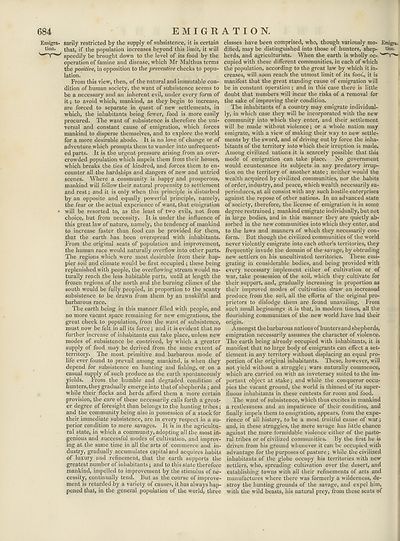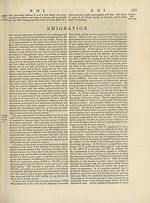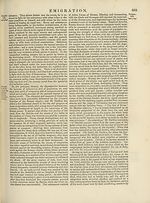Encyclopaedia Britannica > Volume 8, DIA-England
(694) Page 684
Download files
Complete book:
Individual page:
Thumbnail gallery: Grid view | List view

684
EMIGRATION.
Emigra- sarily restricted by the supply of subsistence, it is certain
tion. that, if the population increases beyond this limit, it will
v'—'‘Y"'*-'1 speedily be brought down to the level of its food by the
operation of famine and disease, which Mr Malthus terms
the positive, in opposition to the preventive checks to popu¬
lation.
From this view, then, of the natural and immutable con¬
dition of human society, the want of subsistence seems to
be a necessary and an inherent evil, under every form of
it; to avoid which, mankind, as they begin to increase,
are forced to separate in quest of new settlements, in
which, the inhabitants being fewer, food is more easily
procured. The want of subsistence is therefore the uni¬
versal and constant cause of emigration, which forces
mankind to disperse themselves, and to explore the world
for a more desirable abode. It is no love of change or of
adventure which prompts them to wander into unfrequent¬
ed parts. It is the urgent pressure arising from an over¬
crowded population which impels them from their homes,
which breaks the ties of kindred, and forces them to en¬
counter all the hardships and dangers of new and untried
scenes. Where a community is happy and prosperous,
mankind will follow their natural propensity to settlement
and rest; and it is only when this principle is disturbed
by an opposite and equally powerful principle, namely,
the fear or the actual experience of want, that emigration
• will be resorted to, as the least of two evils, not from
choice, but from necessity. It is under the influence of
this great law of nature, namely, the tendency of mankind
to increase faster than food can be provided for them,
that the earth has been overspread with inhabitants.
From the original seats of population and improvement,
the human race would naturally overflow into other parts.
The regions which were most desirable from their hap¬
pier soil and climate would be first occupied ; these being
replenished with people, the overflowing stream would na¬
turally reach the less habitable parts, until at length the
frozen regions of the north and the burning climes of the
south would be fully peopled, in proportion to the scanty
subsistence to be drawn from them by an unskilful and
barbarous race.
The earth being in this manner filled with people, and
no more vacant space remaining for new emigrations, the
great check to population, from the want of subsistence,
must now be felt in all its force ; and it is evident that no
further increase of inhabitants can take place, unless new
modes of subsistence be contrived, by which a greater
supply of food may be derived from the same extent of
territory. The most primitive and barbarous mode of
life ever found to prevail among mankind, is when they
depend for subsistence on hunting and fishing, or on a
casual supply of such produce as the earth spontaneously
yields. From the humble and degraded condition of
hunters, they gradually emerge into thatof shepherds ; and
while their flocks and herds afford them a more certain
provision, the care of these necessarily calls forth a great¬
er degree of foresight than belongs to the hunting tribes;
and the community being also in possession of a stock for
their immediate subsistence, are in every respect in a su¬
perior condition to mere savages. It is in the agricultu¬
ral state, in which a community, adopting all the most in¬
genious and successful modes of cultivation, and improv¬
ing at the same time in all the arts of commerce and in¬
dustry, gradually accumulates capital and acquires habits
of luxury and refinement, that the earth supports the
greatest number of inhabitants; and to this state therefore
mankind, impelled to improvement by the stimulus of ne¬
cessity, continually tend. But as the course of improve¬
ment is retarded by a variety of causes, it has always hap¬
pened that, in the general population of the world, three
classes have been comprised, who, though variously mo- Emigra.
dified, may be distinguished into those of hunters, shep- tion.
herds, and agriculturists. When the earth is wholly oc-
copied with these different communities, in each of which
the population, according to the great law by which it in¬
creases, will soon reach the utmost limit of its food, it is
manifest that the great standing cause of emigration will
be in constant operation ; and in this case there is little
doubt that numbers will incur the risks of a removal for
the sake of improving their condition.
The inhabitants of a country may emigrate individual¬
ly, in which case they will be incorporated with the new
community into which they enter, and their settlement
will be made without violence; or a whole nation may
emigrate, with a view of making their way to new settle¬
ments by the sword, and of driving out by force the inha¬
bitants of the territory into which their irruption is maole.
Among civilized nations it is scarcely possible that this
mode of emigration can take place. No government
would countenance its subjects in any predatory irrup¬
tion on the territory of another state; neither would the
wealth acquired by civilized communities, nor the habits
of order, industry, and peace, which wealth necessarily su¬
perinduces, at all consist with any such hostile enterprises
against the repose of other nations. In an advanced state
of society, therefore, the license of emigration is in some
degree restrained ; mankind emigrate individually, but not
in large bodies, and in this manner they are quietly ab¬
sorbed in the new communities into which they enter, and
to the laws and manners of which they necessarily con¬
form. But though the civilized communities of the world
never violently emigrate into each other?s territories, they
frequently invade the domain of the savage, by obtruding
new settlers on his uncultivated territories. These emi¬
grating in considerable bodies, and being provided with
every necessary implement either of cultivation or of
war, take possession of the soil, which they cultivate for
their support, and, gradually increasing in proportion as
their improved modes of cultivation draw an increased
produce from the soil, all the efforts of the original pro¬
prietors to dislodge them are found unavailing. From
such small beginnings it is that, in modern times, all the
flourishing communities of the new world have had their
origin.
Amongst the barbarous nations of hunters and shepherds,
emigration necessarily assumes the character of violence.
The earth being already occupied with inhabitants, it is
manifest that no large body of emigrants can effect a set¬
tlement in any territory without displacing an equal pro¬
portion of the original inhabitants. These, however, will
not yield without a struggle; wars naturally commence,
which are carried on with an inveteracy suited to the im¬
portant object at stake; and while the conqueror occu¬
pies the vacant ground, the world is thinned of its super¬
fluous inhabitants in these contests for room and food.
The want of subsistence, which thus excites in mankind
a restlessness and an impatience of their condition, and
finally impels them to emigration, appears, from the expe¬
rience of all history, to be a most fruitful cause of war;
and, in these struggles, the mere savage has little chance
against the more formidable violence either of the pasto¬
ral tribes or of civilized communities. By the first he is
driven from his ground whenever it can be occupied with
advantage for the purposes of pasture; while the civilized
inhabitants of the globe occupy his territories with new
settlers, who, spreading cultivation over the desert, and
establishing towns with all their refinements of arts and
manufactures where there was formerly a wilderness, de¬
stroy the hunting grounds of the savage, and expel him,
with the wild beasts, his natural prey, from these seats of
EMIGRATION.
Emigra- sarily restricted by the supply of subsistence, it is certain
tion. that, if the population increases beyond this limit, it will
v'—'‘Y"'*-'1 speedily be brought down to the level of its food by the
operation of famine and disease, which Mr Malthus terms
the positive, in opposition to the preventive checks to popu¬
lation.
From this view, then, of the natural and immutable con¬
dition of human society, the want of subsistence seems to
be a necessary and an inherent evil, under every form of
it; to avoid which, mankind, as they begin to increase,
are forced to separate in quest of new settlements, in
which, the inhabitants being fewer, food is more easily
procured. The want of subsistence is therefore the uni¬
versal and constant cause of emigration, which forces
mankind to disperse themselves, and to explore the world
for a more desirable abode. It is no love of change or of
adventure which prompts them to wander into unfrequent¬
ed parts. It is the urgent pressure arising from an over¬
crowded population which impels them from their homes,
which breaks the ties of kindred, and forces them to en¬
counter all the hardships and dangers of new and untried
scenes. Where a community is happy and prosperous,
mankind will follow their natural propensity to settlement
and rest; and it is only when this principle is disturbed
by an opposite and equally powerful principle, namely,
the fear or the actual experience of want, that emigration
• will be resorted to, as the least of two evils, not from
choice, but from necessity. It is under the influence of
this great law of nature, namely, the tendency of mankind
to increase faster than food can be provided for them,
that the earth has been overspread with inhabitants.
From the original seats of population and improvement,
the human race would naturally overflow into other parts.
The regions which were most desirable from their hap¬
pier soil and climate would be first occupied ; these being
replenished with people, the overflowing stream would na¬
turally reach the less habitable parts, until at length the
frozen regions of the north and the burning climes of the
south would be fully peopled, in proportion to the scanty
subsistence to be drawn from them by an unskilful and
barbarous race.
The earth being in this manner filled with people, and
no more vacant space remaining for new emigrations, the
great check to population, from the want of subsistence,
must now be felt in all its force ; and it is evident that no
further increase of inhabitants can take place, unless new
modes of subsistence be contrived, by which a greater
supply of food may be derived from the same extent of
territory. The most primitive and barbarous mode of
life ever found to prevail among mankind, is when they
depend for subsistence on hunting and fishing, or on a
casual supply of such produce as the earth spontaneously
yields. From the humble and degraded condition of
hunters, they gradually emerge into thatof shepherds ; and
while their flocks and herds afford them a more certain
provision, the care of these necessarily calls forth a great¬
er degree of foresight than belongs to the hunting tribes;
and the community being also in possession of a stock for
their immediate subsistence, are in every respect in a su¬
perior condition to mere savages. It is in the agricultu¬
ral state, in which a community, adopting all the most in¬
genious and successful modes of cultivation, and improv¬
ing at the same time in all the arts of commerce and in¬
dustry, gradually accumulates capital and acquires habits
of luxury and refinement, that the earth supports the
greatest number of inhabitants; and to this state therefore
mankind, impelled to improvement by the stimulus of ne¬
cessity, continually tend. But as the course of improve¬
ment is retarded by a variety of causes, it has always hap¬
pened that, in the general population of the world, three
classes have been comprised, who, though variously mo- Emigra.
dified, may be distinguished into those of hunters, shep- tion.
herds, and agriculturists. When the earth is wholly oc-
copied with these different communities, in each of which
the population, according to the great law by which it in¬
creases, will soon reach the utmost limit of its food, it is
manifest that the great standing cause of emigration will
be in constant operation ; and in this case there is little
doubt that numbers will incur the risks of a removal for
the sake of improving their condition.
The inhabitants of a country may emigrate individual¬
ly, in which case they will be incorporated with the new
community into which they enter, and their settlement
will be made without violence; or a whole nation may
emigrate, with a view of making their way to new settle¬
ments by the sword, and of driving out by force the inha¬
bitants of the territory into which their irruption is maole.
Among civilized nations it is scarcely possible that this
mode of emigration can take place. No government
would countenance its subjects in any predatory irrup¬
tion on the territory of another state; neither would the
wealth acquired by civilized communities, nor the habits
of order, industry, and peace, which wealth necessarily su¬
perinduces, at all consist with any such hostile enterprises
against the repose of other nations. In an advanced state
of society, therefore, the license of emigration is in some
degree restrained ; mankind emigrate individually, but not
in large bodies, and in this manner they are quietly ab¬
sorbed in the new communities into which they enter, and
to the laws and manners of which they necessarily con¬
form. But though the civilized communities of the world
never violently emigrate into each other?s territories, they
frequently invade the domain of the savage, by obtruding
new settlers on his uncultivated territories. These emi¬
grating in considerable bodies, and being provided with
every necessary implement either of cultivation or of
war, take possession of the soil, which they cultivate for
their support, and, gradually increasing in proportion as
their improved modes of cultivation draw an increased
produce from the soil, all the efforts of the original pro¬
prietors to dislodge them are found unavailing. From
such small beginnings it is that, in modern times, all the
flourishing communities of the new world have had their
origin.
Amongst the barbarous nations of hunters and shepherds,
emigration necessarily assumes the character of violence.
The earth being already occupied with inhabitants, it is
manifest that no large body of emigrants can effect a set¬
tlement in any territory without displacing an equal pro¬
portion of the original inhabitants. These, however, will
not yield without a struggle; wars naturally commence,
which are carried on with an inveteracy suited to the im¬
portant object at stake; and while the conqueror occu¬
pies the vacant ground, the world is thinned of its super¬
fluous inhabitants in these contests for room and food.
The want of subsistence, which thus excites in mankind
a restlessness and an impatience of their condition, and
finally impels them to emigration, appears, from the expe¬
rience of all history, to be a most fruitful cause of war;
and, in these struggles, the mere savage has little chance
against the more formidable violence either of the pasto¬
ral tribes or of civilized communities. By the first he is
driven from his ground whenever it can be occupied with
advantage for the purposes of pasture; while the civilized
inhabitants of the globe occupy his territories with new
settlers, who, spreading cultivation over the desert, and
establishing towns with all their refinements of arts and
manufactures where there was formerly a wilderness, de¬
stroy the hunting grounds of the savage, and expel him,
with the wild beasts, his natural prey, from these seats of
Set display mode to:
![]() Universal Viewer |
Universal Viewer | ![]() Mirador |
Large image | Transcription
Mirador |
Large image | Transcription
Images and transcriptions on this page, including medium image downloads, may be used under the Creative Commons Attribution 4.0 International Licence unless otherwise stated. ![]()
| Encyclopaedia Britannica > Encyclopaedia Britannica > Volume 8, DIA-England > (694) Page 684 |
|---|
| Permanent URL | https://digital.nls.uk/193332027 |
|---|
| Attribution and copyright: |
|
|---|
| Description | Ten editions of 'Encyclopaedia Britannica', issued from 1768-1903, in 231 volumes. Originally issued in 100 weekly parts (3 volumes) between 1768 and 1771 by publishers: Colin Macfarquhar and Andrew Bell (Edinburgh); editor: William Smellie: engraver: Andrew Bell. Expanded editions in the 19th century featured more volumes and contributions from leading experts in their fields. Managed and published in Edinburgh up to the 9th edition (25 volumes, from 1875-1889); the 10th edition (1902-1903) re-issued the 9th edition, with 11 supplementary volumes. |
|---|---|
| Additional NLS resources: |
|

